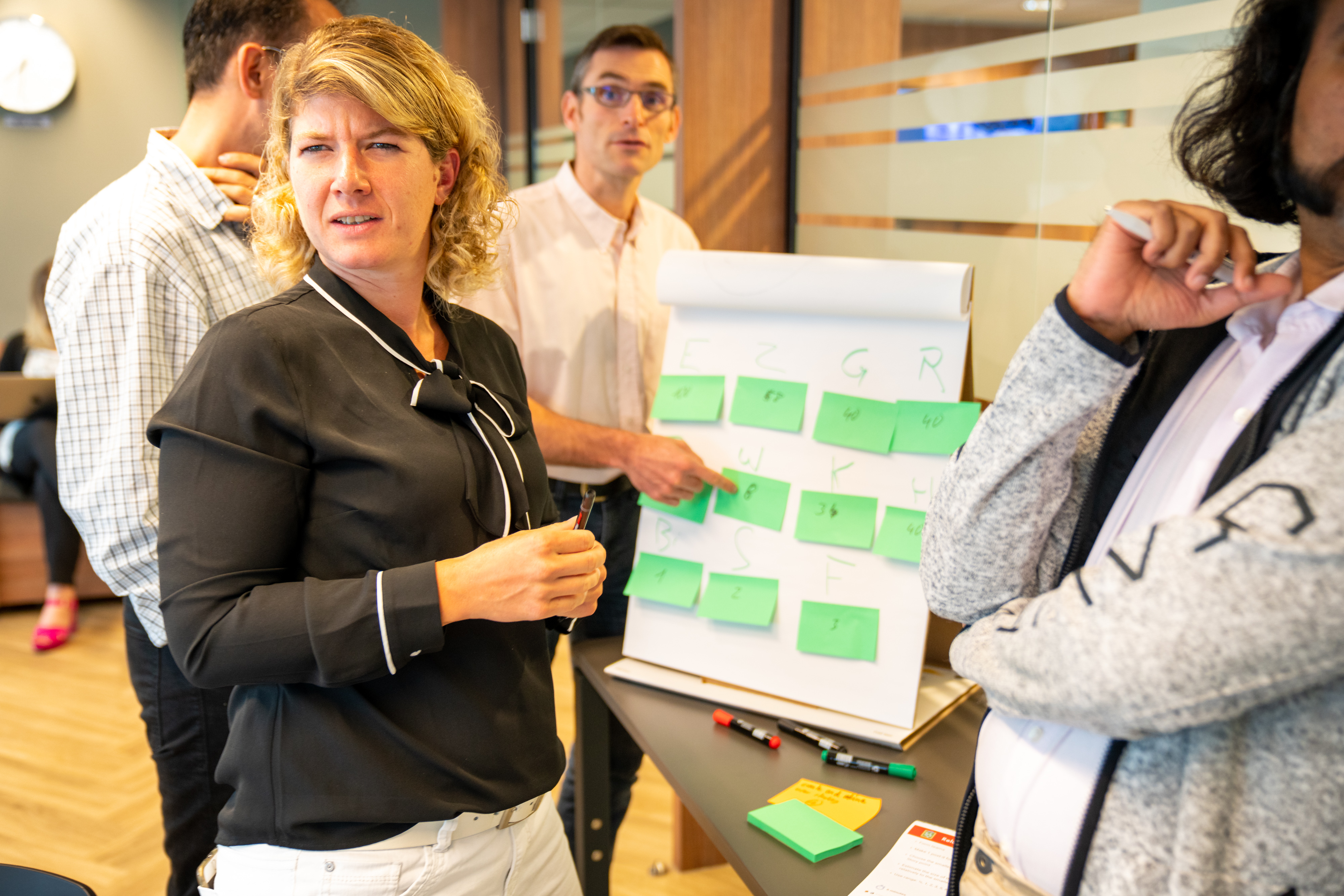How do you get Agile working truly established in your organisation? By training your own Agile Coaches to become Agile Trainers, of course! They can train new and existing employees and coach the organisation. This is what Nationale-Nederlanden has worked on in recent months with Gladwell Academy. CIO Dennis Brussel from Nationale-Nederlanden Bank tells us about his considerations; three Agile training course graduates tell us about their experience.
Case study: Nationale Nederlanden (Train the trainer)

Why would you have Agile trainers and coaches trained yourself?
Dennis Brussel is in no doubt: ‘Agile thinking and working with Scrum started in around 2011 with us in the IT department, as it does with many companies. Since then we’ve continued to expand the extent to which we work with Scrum and Kanban. Taking an incremental approach to projects, working based on iterations, self-organising teams – this goes without saying for organisations which, despite their size, want to have the versatility that customers expect.’
He continues: ‘It doesn’t go at the same pace everywhere. Nationale Nederlanden Bank is leading the way within Nationale Nederlanden and within the Bank the different fields are also running at different speeds. But across the board, we know that Agile is here to stay, and so we want to continue internalising it further.’
What happens when the external Agile consultant goes back home?
The ultimate goal is to maintain the momentum within your organisation, explains Dennis. ‘And central to the idea of maintaining momentum is that the train shouldn’t stop if we lose one specialist. Scrum coaches are specialists; Agile trainers too. What would happen if our external Agile expert were to go back home, and we didn’t have one ourselves? Thankfully we had our own Scrum coaches by this point. But what if the Agile Trainer left?’ ‘Exactly,’ he continues. ‘This is why we decided to work with Gladwell Academy, when they offered to train our people as Agile Coaches and Agile Trainers. We work with a Pi profile here – the idea is that in addition to their core discipline, someone should study at least one other discipline. Then you can always share your work with each other, to a certain extent. This breaks through ‘silo thinking’ and ‘insular culture’.
Building such an extra competence in Agile perfectly complements the Pi profile of the person concerned, and it ensures the continuation of our development as an Agile organisation.
What have you actually learnt here?
Around the table we have three Agile Coaches, who are in the process of completing the ‘Agile Train the Trainer’ course. Philip Woest, Ruby Eikelenboom and Jacques Arends. They share their reasons for taking part, their experiences with the programme and their ideas about what’s next:
Trained in different Agile areas
Philip Woest: ‘I have always had coaching skills. Before my career at Nationale-Nederlanden I had already been a team leader elsewhere; here I quickly became a Scrum Master. So when I heard that Nationale-Nederlanden
wanted to train its own coaches “bank-wide”, that really appealed to me.’
‘We were trained for sixteen days in three areas: our coaching skills, our skills to train ourselves, and a third part contained advanced content about Agile.’
‘I understood that the programme is new for Gladwell Academy; but it didn’t show. It all went together smoothly and logically. I could also clearly see that the trainers had made the effort to stay as close as possible to our practice.’
Practical experience – a real benefit
Philip continues: ‘Practice played a big role in any case. As participants we had a diverse group: all colleagues in different areas at Nationale-Nederlanden. Their experience with Agile was already a really good showcase in itself.’
‘But the trainers also clearly had a lot of practical experience, and they used it well. Not in a lazy way: if you only use practical experience then the training course can become a kind of game of exchanging anecdotes: “I was once somewhere…” Fortunately they avoided that: just relevant cases.’
Learning to approach the Agile mindset as trainers
Jacques Arends: ‘I also said right away that I was really looking forward to the course, because it’s an extension of what I already do at Nationale-Nederlanden. I have an executive role myself, and skills development is definitely part of that. I wasn’t yet a Scrum Master, but I was a Green Belt Lean expert.’
‘It’s a very intensive training course: each block contains around four or five days. In addition you also have to spend time processing the content you’ve learned, and preparing for the next block. But the atmosphere was really good: we were doing something new together. Working towards a goal together! We truly learnt how to approach Agile as trainers and coaches: how do you pass on your knowledge? How can you turn your knowledge into a real story? What is your storytelling technique, how do you inspire people? How do you turn your story into other people’s story?’
He smiles. ‘I already use aspects from the training course in my work. I already coached teams, so in that respect I could apply my training immediately. In addition, I want to turn my own role into that of a full-time Agile Coach. I can’t wait until I can get to work with teams.’
Participants in the Agile Train the Trainer course, including: Philip Woest, Ruby Eikelenboom and Jacques Arends.
How do you get Agile coaches who ‘can handle it’?
Dennis continues his explanation about the decision to have his own people trained as trainers by Gladwell Academy. ‘In itself it was quite an easy choice; not only are they a well-known name on the market for Agile training courses, but also because they’re part of the same group as BlinkLane Consulting. BlinkLane consultants already supported us with Scrum Masters and Coaches in different areas.’
He leans back for a moment: ‘I’m quite satisfied with the partnership. Our people have gained a lot of new knowledge and skills here in a short time about the role they’re going to play. I’ve heard about the positive energy from various people. It’s a challenging training course, I hear that too – but it should be. It’s better to have the answer to the question ‘Can I handle this job?’ right away, rather than only finding out afterwards in practice. The people who enjoyed completing the training course here are the ones who are also really going to do it.’
What does the future bring for Nationale-Nederlandenwith its own Agile Coaches and Trainers? One level higher: DevOps
Ruby Eikelenboom had already been a Scrum Master within the Mortgages Department for several years. She recently completed the Agile Train the Trainer course, and now she will train Scrum Masters herself within NationaleNederlanden. ‘The Mortgages department has already been at the forefront with Agile for a few years now within Nationale-Nederlanden. So now we’re working on the next step there with great enthusiasm: the DevOps set-up. This would really be the next level for us; the Agile way of working itself is already widely accepted here.’
Dennis builds on this: ‘Yes, I also see DevOps as a component that an Agile organisation needs at a certain point. I see it as a trinity; Agile Way of Working (WoW), the DevOps set-up and Continuous Delivery as a means of software development. One of the principles of DevOps is that each person in the team is capable of taking over all the other people’s roles to a certain extent. This allows you to prevent silo thinking and again, you become more flexible.’
Technology is an important driver of the trinity, specifically of Continuous Delivery, which our cloud movement is an important part of.
Independent PI events
‘A concrete change is that we can now carry out the PI events with our own coaches. PI events are two-day Program Increment events which we organise every quarter for the entire bank. Our people will soon be able to organise, prepare and support these PI events entirely by themselves.’
‘Technology is an important driver of the trinity, specifically of Continuous Delivery, which our cloud movement is an important part of. In order to allow these changes to be properly implemented, Nationale-Nederlanden propagates an Engineering Culture.’ ‘In order to continue the Agile movement not only now, but also in the future, not only do our Agile Coaches train Product Owners, Scrum Masters and Agile Teams, but also new Agile Coaches.’
Advice for other organisations: ‘Agile has no final destination.’ When asked whether he has any more advice for other organisations who want to strengthen the Agile WoW in this way, Dennis doesn’t have to think long. ‘Buy-in from the senior management is crucial, every step of the way.’
‘The Agile way of working is a bit further away from the trusty ‘dot on the horizon’ of the past. We also choose a dot on the horizon, but it always moves with us. As the management you do need to be able to deal with this. Coaches can help, but buy-in is needed here.’
‘What’s more, your investments in Agile are on top of the normal work your organisation has to do. So before you put people to work as Agile Coaches: make sure that they also have the time and are given the time to do this work.’
‘Ultimately our own coaches ensure our continued development as an Agile organisation.
Cost assessment also plays a role here: external trainers and coaches are expensive. But this pales in comparison to the importance of momentum.’

About the Course
Do you have the ambition to become a professional Agile Trainer who helps people to take the next step in their development? During this interactive sixteen-day course, we train you to become an Agile Trainer. At the end of it you’ll go home with a package of skills that will enable you, as an Agile trainer, to develop and facilitate an educationally responsible training course, and test learning outcomes. Soon you’ll be standing in front of the group and bringing an Agile transformation to life.
Interested?
Has reading this made you interested in becoming an Agile Trainer and using your personal strength to benefit your internal organisation? Then it’s easy to sign up for the next Agile Coach or Train de Trainer course.
